Soccerex European Forum – Manchester (March 2012): The Soccerex Supplement
Day 2 – Thursday 29 March 2012
15:45 – 16:45 The Soccerex Supplement
- Dan Walker (BBC)
- Paddy Barclay (Football Writer)
- Phil Thompson (Sky Sports and Former England International)
- Peter Reid (Former England International)
- Bryan Robson (Former England International)
- John Barnes (Former England International)

Dan Walker opened the debate with a question to the panel about who would take the Premier League title this season. Peter Reid said that the recent away form of Manchester City had been their undoing and so were the outsiders to win it now. Phil Thompson hoped that the race would still be alive by 30 April when City and United met at the Etihad Stadium, but said that the difficult run-in for Mancini’s team could yet work in their favour. Dan Walker asked Bryan Robson whether Sir Alex Ferguson would have panicked after the 6-1 defeat by City at Old Trafford. Robson said that Sir Alex would have simply used the defeat as a learning experience for him and the team and added that if United won nothing this year, there were positives to be taken from the season. Paddy Barclay described Ferguson as a ‘warlord’ and ‘a clever man’ who generally bought early in the close season to have maximum preparation time. He acknowledged that in Europe both Manchester clubs had been outplayed. Bryan Robson said that United had been a force in Europe for a number of years, and this season was a minor blip. Dan Walker wanted to know what it said about City if they failed to win the League this year. Bryan Robson replied that the club would take stock, recognise that they had improved and then make the appropriate signings. Phil Thompson believed that Manchester City were still a ‘work in progress’. They won the FA Cup and qualified for the Champions League last season and had run a good race for the title this time round. This was not a view shared by Peter Reid, who said that City should have won what has been a pretty weak Premier League season. Paddy Barclay added that City simply won’t be able to go out and buy more talent, because of the impending introduction of the UEFA Financial Fair Play Regulations.

Moving away from the title race, Dan Walker asked which was better – La Liga or the Premier League. Walker pointed out that Barcelona and Real Madrid averaged four goals at home, yet Athletico Bilbao (who were 36 points behind the leading two clubs) humbled Manchester United in the Europa League over two-legs. Paddy Barclay said that the rivalry between Barcelona and Real Madrid was the greatest things he had witnessed in football and was a level above the Premier League. Peter Reid added that 20 years ago, La Liga was in turmoil, but now Spain were European and World Champions, so must be doing something right. Phil Thompson believed the Premier League to be the best competition, because of the fans, the intensity and the ability to play in all weathers. However, maybe skill-wise La Liga had the edge. In terms of Real Madrid, Thompson said that he felt José Mourinho was a bit of a ‘gypsy’ in that he doesn’t want to get too close to a club. Bryan Robson said that Mourinho would be top of the list to take the Old Trafford job in the future. Paddy Barclay added that whoever took over would have to be a huge personality and be ‘Fergie’s choice’. If not, Ferguson could make the new manager’s life a misery as the shadow of Sir Matt Busby had done. Barclay lauded the old Liverpool model of a strong Chief Executive and Chairman, with a manager and experienced boot-room. Peter Reid said that doesn’t always work as Manchester United found, when Wilf McGuinness succeeded Sir Matt Busby.
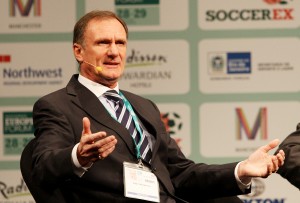
Moving on, Dan Walker asked about the situation at Liverpool and their recent League form. Phil Thompson said that at the start of the season Liverpool could have said to have been unlucky, with the stats showing a high number of occasions when they have hit the post. However, when this extends into the second-half of the season, you have to look to see if there is a deeper rooted problem. John Barnes believed that the Anfield club have been too reliant on Suarez and Gerrard this year and that the jury was still out on the big signings such as Carroll and Henderson. Peter Reid said that he thought some of the signings were strange and personally he would have taken Jermaine Defoe over Andy Carroll. He questioned whether many of the Liverpool players had the ‘balls’ to succeed. Phil Thompson said that signings like Henderson and Carroll maybe for the future of the club, but that expectation demanded that they delivered now. John Barnes believed that Kenny Dalglish wanted British strength in the side and so went for Charlie Adam and Andy Carroll. However, he added that Liverpool were 3 or 4 players short of seriously challenging for the title and there was a distinct lack of quality amongst the squad players. Peter Reid said that despite the win in the League Cup, there was pressure on Kenny Dalglish and it seemed to him that the Anfield boss was not really enjoying the job.

The topic of racism in football was tackled next. John Barnes said that for 90 minutes at a game, people could just put a lid on their racist views, but outside of the ground would revert to type. Football he said had a ‘we don’t want to hear it’ mentality and that for black players the situation had improved. However, for the ordinary black man on the street, was it any better? Peter Reid said that football was doing its bit to address racism, and if it only made a small difference, surely this was progress. Phil Thompson said that in Eastern Europe the situation was far worse than in England. John Barnes countered, that is this only being said now because it has improved in England, as no one was saying how bad it was abroad 20 years ago. Paddy Barclay responded that football and music had the two main tools in helping break down the problem and create a better situation. Barnes asked again, ‘who was it better for?’ and added that it was not stopping racism. Phil Thompson stressed that the profile of football was bringing racism to the fore and trying to deal with it, but was concerned as to whether UEFA or FIFA was doing enough to tackle it. John Barnes added that in countries such as Macedonia it would take time, as they didn’t have or understand the multi-cultural diversity of England. Peter Reid said that education was key in tackling the issue.

For the final question, Dan Walker asked the panel how England would get on at the European Championship Finals this summer. Bryan Robson said the urgent thing was to get the new coach in place as the players needed to know. Peter Reid said that England won’t get out of the group, but Phil Thompson said that the team still has some good players and anything is possible, as proved by Denmark (Winners 1992) and Greece (Winners 2004). John Barnes thought that the low expectation of the media and fans could work in our favour. However, with Rooney missing the first two games, he believed England would be lucky to get past the group stage. Paddy Barclay tipped Germany to win the tournament and said the low fear factor could help the England players. He would appoint Glen Hoddle as a caretaker manager, so that Harry Redknapp could see out the season with Tottenham and then start afresh.
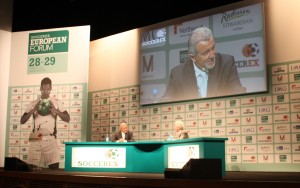
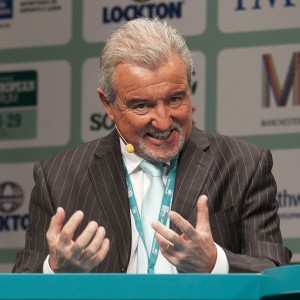
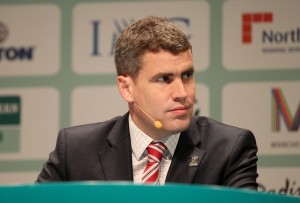
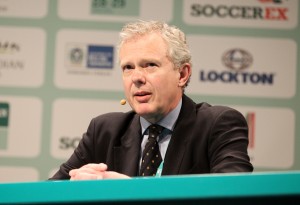
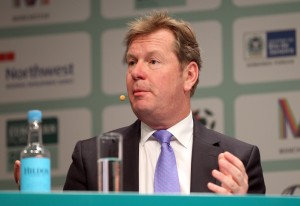
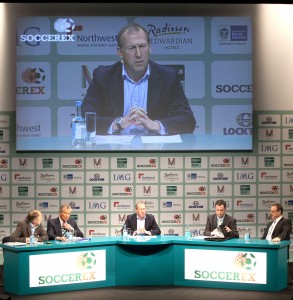
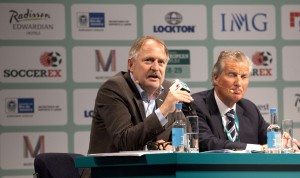
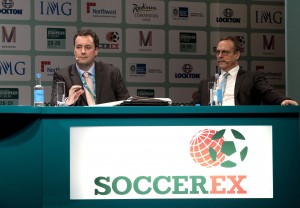
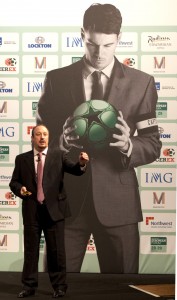 Rafa Benitez opened his presentation by saying that the modern manager was one that had to adapt and move quickly with the changing times. The modern coach or manager has so much more information at their disposal, from sources such as Opta and Prozone. Having worked in England, Spain and Italy he is ideally placed to talk about the different ways clubs in these countries operate. For example he outlined possible operational models in England and Europe:
Rafa Benitez opened his presentation by saying that the modern manager was one that had to adapt and move quickly with the changing times. The modern coach or manager has so much more information at their disposal, from sources such as Opta and Prozone. Having worked in England, Spain and Italy he is ideally placed to talk about the different ways clubs in these countries operate. For example he outlined possible operational models in England and Europe: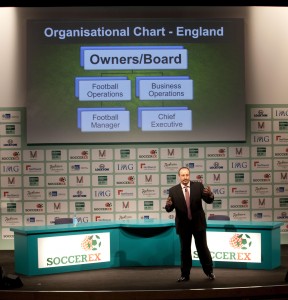 Benitez also highlighted that to succeed as a manager you need to understand what motivates players. However, this varies greatly, with different approaches taken for example by Sir Alex Ferguson, Vicente del Bosque and Harry Redknapp.
Benitez also highlighted that to succeed as a manager you need to understand what motivates players. However, this varies greatly, with different approaches taken for example by Sir Alex Ferguson, Vicente del Bosque and Harry Redknapp.
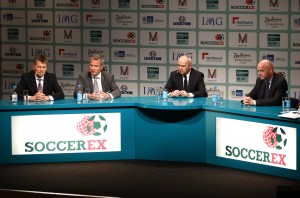

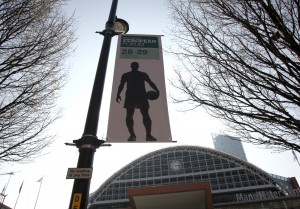
 This week the Soccerex European Forum takes place, the first of three events in 2012 under the Soccerex banner. The European Forum is being held in Manchester and is followed later in the year (September) by a two-day seminar in Lagos looking at “Developing Football in West Africa”, with the final event in November as the Soccerex Global Convention takes place in Rio de Janerio.
This week the Soccerex European Forum takes place, the first of three events in 2012 under the Soccerex banner. The European Forum is being held in Manchester and is followed later in the year (September) by a two-day seminar in Lagos looking at “Developing Football in West Africa”, with the final event in November as the Soccerex Global Convention takes place in Rio de Janerio.